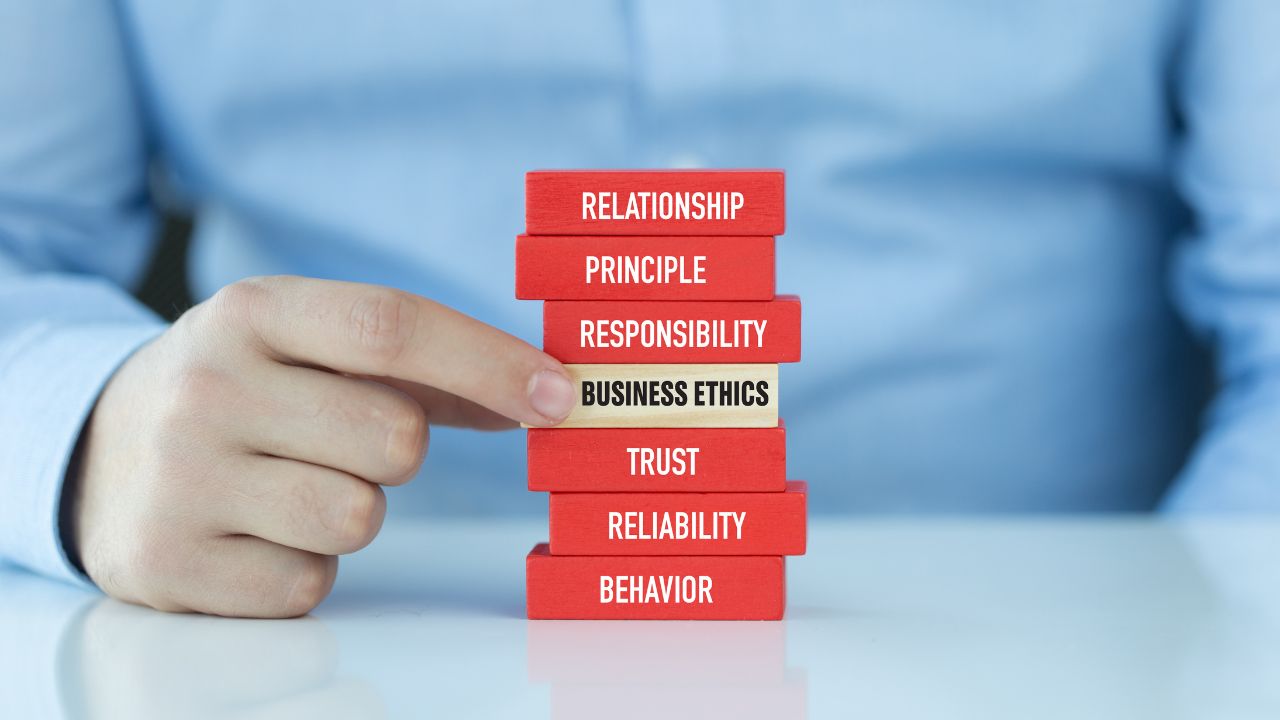With the contemporary global economy being completely interconnected a dynamic enterprise, business faces a litany of ethical issues unlike ever before. From privacy issues related to consumer data to the environment’s sustainability, the scope of ethics continues to broaden. Despite increased regulation, businesses have become a prominent, not to say the prominent, influence in the shift of focus towards the social and ethical milieu. When businesses pursue growth with only profits in mind, consumers and society suffer. Resembling health, a business that appears to be flourishing with its robust and expanding framework may be unethical. A business or a manager who lost their business ethics is like a Metropolis or a Frankfurt Novel character who lost his Monad. This article will guide you through business ethics for the 21st century. Consequently, at the end of this writing, readers are expected to have a basic understanding of business ethics, its key principles, and its guidelines for business practices.
Understanding the Foundations of Business Ethics
Definition and Importance
Business ethics is the source of the norms and standards by which corporations must conduct themselves in the world. In short, they are the means by which business can generate trust and influence from its stakeholders, including customers, employees, investors and the larger community. In our modern business environment, ethical behaviour is not only the right thing to do but a crucial competitive advantage. Businesses that practise ethical behaviour are more likely to generate good, sustainable, stakeholder relationships, enhance their reputations and improve their long-term profitability.
But business ethics is also about the values and moral judgments that direct corporate culture and decision-making. By discouraging fraud, corruption and other forms of misconduct, ethical business conduct can protect not only the interests of a company’s stakeholders but also its own. And a highly ethical culture can motivate and retain employees while creating a desirable workplace and a clear vision for the organisation.
Historical Context and Evolution
The idea of business ethics has indeed been subject to change; in fact, changes in the broader society, the economy, and regulatory frameworks have shaped the parameters of business ethics over centuries. Traditionally, business ethics has been based largely on biblical or other religious and philosophical teachings, and served as a check on unethical conduct in commercial life. During the first half of the 20th century, the prevalence of commercial and corporate scandals, and the economic disaster of the Great Depression, resulted in increased attention being paid to ethical norms and corporate governance.
The realities of business ethics changed dramatically with globalisation and modern technology in the second half of the 20th century. A concern with data privacy, cybersecurity and intellectual property is now a key topic in business ethics due to the rise of the digital age. Modern business ethics are also faced with new realities and concerns about the environment and sustainability, as well as the social responsibility of companies and their executive leaders (for example, additionally called corporate social responsibility or CSR, and environmental, social and governance or ESG criteria). Business ethics become more dynamic when companies try to incorporate new trends and expectations in their morally exemplary behaviour.
Key Principles of Business Ethics
Integrity and Transparency
Integrity and transparency are cornerstones in business ethics, principles that support trust and employer accountability. Integrity can be described as conforming with principles of moral and ethical conduct or adhering to strong standards of honesty and fairness in all aspects of business activities. Transparency, on the other hand, concerns the submission of business practices, decisions and performance to public scrutiny.
Combined, integrity and transparency help to build trust with external stakeholders as well as within the company’s own personal culture. Those companies that invest in their ethical make-up, and create the right type of ‘corporate culture’, are more likely to build a base of happy customers, committed employees and loyal top-line investors. Equally, the transparency that opens the gates to integrity can make it easier to detect and defuse attempts at unethical behaviour within the company. In this age of media, where much of what we do is recorded and published for general circulation, it has never been more important to be transparent in what we do as a company, in order to protect the reputation and safeguard the future of the company.
Accountability and Responsibility
Ethical business requires both accountability and responsibility. Accountability means owning what you do – as in both the good and the bad that result – and taking ownership of your actions and failures. Accountability requires businesses to take responsibility for their actions in front of their stakeholders, and to redress where they are in the wrong. Responsibility, meanwhile, means owning the obligations that you have to other people and stakeholders of an organisation, including customers, employees, investors and the community.
If companies shoulder accountability and responsibility, their stakeholders will know that the companies are serious about their ethics, which will contribute to the reputation and competitive edge of the companies. However, most important is that creating a culture of accountability and responsibility will prevent ethical lapses; the company will know that its employees and leaders will not act contrary to the values and ethics that are crucial for the business to last.
Ethical Decision-Making in Business
Frameworks and Approaches
Ethical decision-making in business is the process of choosing actions that are ultimately the most ethical – in other words, the choices that are most consistent with certain ethical principles and values. Different frameworks and approaches can be used to guide this process: for example, utilitarianism, deontology and virtue ethics. Utilitarianism emphasises outcomes – doing what will lead to the greatest happiness and the least harm. Deontology focuses on ethical rules and duties – the belief that actions are right or wrong depending on whether they adhere to ethical rules. Virtue ethics focuses on the role of good character and virtuous behaviour in ethical decision-making.
Each can provide insight and guidance to companies facing ethical challenges, and each offers a set of useful tools that can help them. For instance, utilitarianism can serve them well when solving ‘trolley problems’ – or those situations when competing interests must be weighted against one another. Deontology can provide a practical and accessible set of rules for conducting things ethically. And virtue ethics can be a powerful force for cultivating the personal and organisational habits of morally excellent character.
Practical Strategies
Next to ethical frameworks, what can a business do in a practical sense? It can try to ensure that ethical decisions are made and decisions to violate ethics are prevented by a robust ethical framework, but there is a useful complementary strategy as well – proactive strategies for supporting ethical decisions. For example, a business can develop a code of ethics or values – an official statement of the company’s commitment to certain values and an open discussion of what these values demand of employees in their decisions, when to exercise professional judgement in a way that is best for the situation and company goals, and where to seek assistance and counsel. To be effective, the statement should be visible, discussed with every employee, and integrated into policies and ‘rules of thumb’. In turn, training programmes can orient employees to ethical principles and help them apply them in their daily jobs.
A related tactic is to establish culture and governance structures that facilitate good behaviour, raise awareness of ethics issues and also offer forums for addressing and rectifying possible infringements. This may include establishing an ethics committee, offering whistleblower policies and policies and regular ethics audits. In this way, companies that anticipate the ‘dark side’ of human nature and take efforts to embed ethical decision-making in corporate culture are not only more likely to achieve the ‘bright side’ but will be better placed to deal with ethics challenges as they arise.
The Role of Corporate Social Responsibility (CSR)
Definition and Importance
Corporate social responsibility (CSR) refers to the voluntary actions that companies take to make a positive difference on societal issues, using more and better workplace practices, embracing sustainability, and engaging responsibly with their impact on the environment and society. CSR can include initiatives to reduce carbon emissions, improve labour practices, advance community development, and enhance diversity and inclusion.
CSR has potent business benefits beyond social and environmental responsibility. A reputation for good CSR can translate into greater customer loyalty and employee engagement, as they too will tend to be more deeply committed to a business if they agree with its values. What’s more, consumers and investors alike are more likely than ever to seek out businesses whose CSR ethos matches their own. Failing to strike the right chord on CSR is likely to result in businesses losing market share. The greater labour mobility and diversity of today’s workforce means that CSR can also play a facilitating role in recruiting and retaining employees.
Implementing CSR Initiatives
In order to succeed, CSR needs to be carefully planned: it needs to be closely tied to the underlying mission of the business. The process starts with identifying the social and environmental issues that are most significant for the business and its stakeholders. A ‘materiality assessment’ can help to identify where a company might make its biggest contributions. A company’s priorities are then translated into ambitious goals, along with concrete plans for action.
Successful CSR work, however, calls for strong leadership up and down the company, from senior managers who demonstrate commitment to CSR in words as well as resources to employees, customers and other stakeholders who can and should be engaged in the CSR process. Cultivating a culture of environmental responsibility and social responsibility can result in a world we all can hope to live in.
Navigating Ethical Challenges in the Digital Age
Data Privacy and Cybersecurity
Privacy of data and the security of the data in the digital age is more of an ethical issue for businesses than a right or a societal issue THE RISE OF CYBER ETHICALS
A company in today’s world collects and retains profiles of its clientele that include personal information that is often privately intimate in nature. The reputation and good name of any company is dependent upon its referability amongst its customers. These giant companies also collect data on transactions and, if they are able to retain this information over time, they can gain a much deeper insight into how customers have grown and evolved – their likes and dislikes, spending habits and other details that are more accurately described as intimate.
Unjustifiable access to this data and breaches can be inflicted upon millions of people, causing great distress and psychological harm.
Businesses need to take robust measures to meet this challenge, including data protection best practices (such as the use of encryption, security of data storage and secure destruction, regular security audits and so on), compliance with relevant data privacy legislation (for example, the General Data Protection Regulation in the European Union), training for employees on issues related to data privacy and cybersecurity, and keeping ahead of new threats. Data privacy and cybersecurity are closely linked. But there is a third issue that they both have to grapple with, even if it is not typical in communities of cybersecurity experts. Behind all the technical talk and public-health metaphors is a deep ethical question. Just as all that data floats around in what scientists call the internet, it also relies for its meaning and its value on us as human beings. The overriding ethical challenge is to use the internet and the data we produce for the flourishing of others, rather than as a means of exploitation and the pursuit of gratification. As for the data that businesses produce, those who store, distribute, purchase or analyse it need to protect the wellbeing of all those who can be affected by it, both directly and indirectly.
Ethical Use of Technology
The ethical use of technology is just as much an issue for business as concerns about data privacy and cybersecurity. Companies are increasingly grappling with the ethical use of technology, whether that be with issues around the ethics of artificial intelligence (AI), algorithmic bias or how technology is changing employment or society more broadly. Many companies must find ways to address these challenges to a greater extent than ever before as technology develops.
An essential part of ethical technology use is the elimination of algorithm bias, which happens when an AI system produces unfair or discriminatory results. Companies should be using techniques to minimise bias and foster fairness in their AI systems, such as curating diverse datasets for AI training, running regular audits and introducing ethicists into their development processes. Companies should consider the full social impact of their technological innovations and proactively take steps to mitigate any deleterious effects. Technology is a powerful tool that companies are now routinely utilising for their business purposes. Business should ensure that its ethical commitments are not compromised through hasty technological adoption.
Building an Ethical Corporate Culture
Leadership and Governance
Great cultures of ethics in corporations are undergirded or supported (or not) by great leadership – direction from a handful of leaders acting alone can make an ethical culture come alive – and, by great governance. Directors and senior management run the show and the buck stops with them. And these learning processes can be very hasty at times. Leaders in companies need to model ethical behaviour, generate and reinforce expectations, and establish mechanisms of accountability.
Good governance structures can reinforce ethical behaviour, including through the oversight and oversight of senior management (eg, an ethics committee, regular ethics training, ethics audits) and by developing and enforcing a corporate code of ethics that spells out the company’s values and expectations for ethics, and thereby signals commitment to ethics at the company’s highest echelons.
Employee Engagement and Communication
In turn, company leaders need to bring employees into the ethical fold – not just telling employees what the company expects of them on ethics issues, but also involving employees in developing ways to raise issues, to say ‘no’ and to speak up. This will help to build an ethical culture where speakers are comfortable raising issues and whistleblowers feel safe in reporting misconduct.
It can set up regular ethics training, give ethics classes and do communication campaigns. It can open communication channels for the reporting of ethical issues, such as anonymous hotlines. It can recognise and reward ethical behaviour. It can involve all the employees in its ethics efforts.
Conclusion
Running a business ethically in today’s world will require a thorough understanding of ethical principles, and an abiding determination to act ethically in all operations. Acting with integrity, being transparent, accountable and responsible, will ultimately build and sustain trust with stakeholders in the long term. By utilising robust decision-making frameworks and strategies, being socially responsible, dealing with ethical challenges in digital space and building an ethical corporate culture, you will be able to develop an ethical business. As the business environment evolves, it is important to remain up‑to‑date with the new ethical issues and to make adjustments to the business practices accordingly to keep pace with the new expectations of stakeholders.



